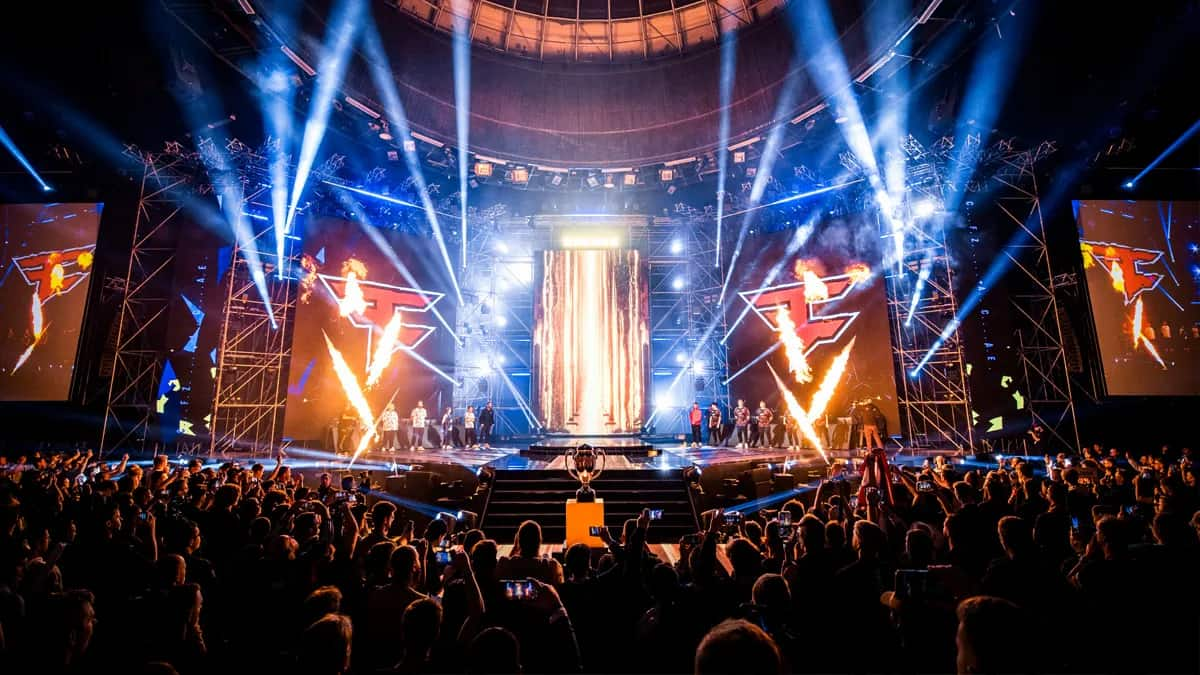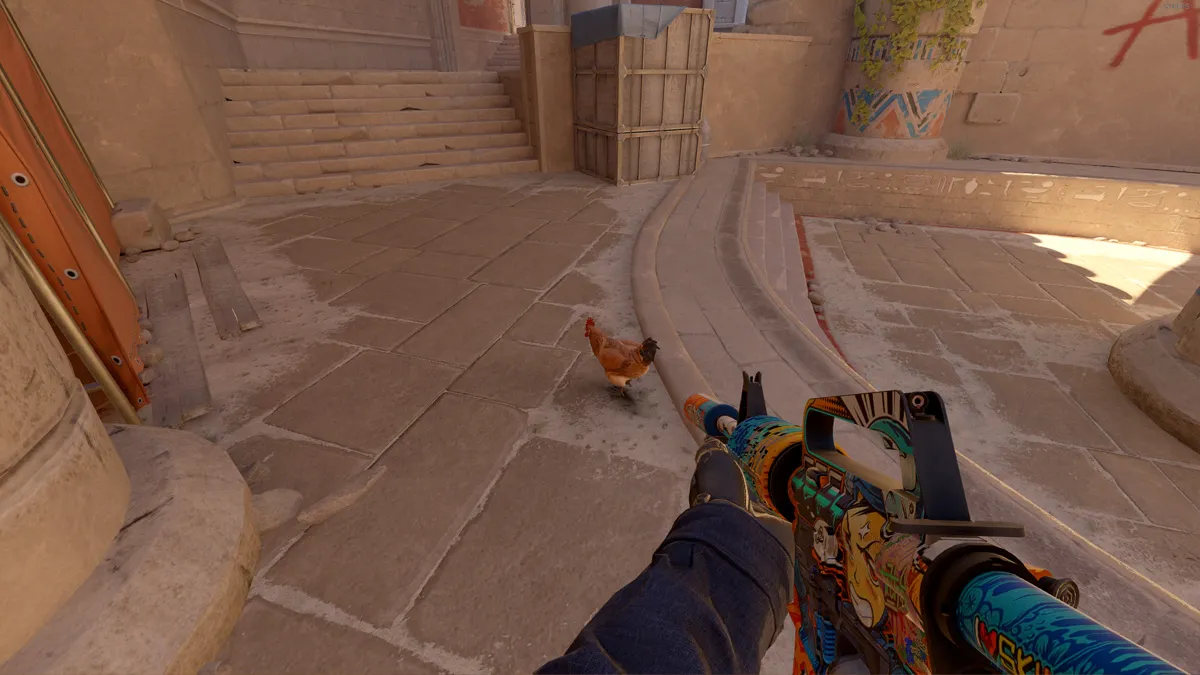On July 13, Valve issued a notice about its in-game trading system that looked like the end of skin betting. Then, two days ago, Valve sent a cease-and-desist letter that seemed to spell certain doom for the major skin-betting sites. So why are they still around—and what will happen to them?
The skin-betting industry, which facilitates online gambling using in-game CS:GO decorations as currency, reportedly took from $2 billion to $7.4 billion in bets annually. Skin betting furthered interest in CS:GO by raising the value of skins and promoting wagers on premier matches, but it also occupied a legal gray area for a number of reasons, including the possibilities of underage gambling, online gambling in jurisdictions that disallowed it, money laundering, match fixing, and outright scamming.
The “multiple lawsuits“ seeking class-action damages and the bad publicity following a prominent betting scandal may have convinced Valve the indirect benefits were not worth the legal risk, prompting it to release the first announcement, the “In-Game Item Trading Update.” The announcement was a clear signal that skin betting was over—except that all of the major sites continued to operate, including CSGO Diamonds, at the center of the betting scandal less than a month earlier.
This may have prompted Valve to issue the cease-and-desist order, which reads, in part: “You should immediately cease and desist further use of your Steam accounts for any commercial purpose. If you fail to do this within ten (10) days Valve will pursue all available remedies including without limitation terminating your accounts.” The order names 23 of the largest skin-betting sites, the majority of which, as of Wednesday afternoon, have yet to even acknowledge the order, much less cease operations.
Fourteen of the sites continue to operate. Six posted announcements that ranged from defiant to capitulatory. “Our site is still working!” claimed one. “You can withdraw and deposit items. It may take some time.” Another, CSGOCrash said it was “NOT planning to cease operations, and will do whatever it takes to comply with Valve’s Terms of Service.” CSGOPot, for its part, said news of the cease and desist letter was “all fake” and that it “didn’t receive any e-mail from Valve!”
Three of the named sites are suspending operations or closing: csgodouble.com, csgocasino.net, and societylogin.com.
The sites named by Valve represent far less than the entire skin-betting industry: “I found 50 sites in 10 minutes of Googling last week,” wrote gambling-industry analyst and U.K. expert Luke Cotton. “I’m surprised that more aren’t listed,” he said, singling out one called skinarena.com. The fate of these sites, as well as the industry at large, remains uncertain.
Three different esports-betting experts—Cotton, Bryce Blum, general counsel to Unikrn, and Chris Grove, industry analyst—had three different interpretations of Valve’s announcements, and three different outlooks on the future of skin betting. (Valve did not respond to a request for comment.)
Paragraph one of Valve’s announcement reads “In 2011, we added a feature to Steam that enabled users to trade in-game items as a way to make it easier for people to get the items they wanted in games featuring in-game economies.” Is that all they had in mind? Aside from skin betting, has it been successful?
Bryce Blum: If you set aside the growth of unlicensed, unregulated skin gambling, the steam marketplace is a huge success and net benefit for players. People love skins and one of the best things about skins is that their relative value decreases over time. Having the ability to trade or sell a skin to another user who hasn’t owned it before creates the potential for a win-win.
Luke Cotton: I don’t think they could have foreseen at that point that the Open API (which was pretty popular back then in general, from recollection) could be used for gambling due to the creation of bot accounts to act as automatic intermediaries between users.
In paragraph two, Valve denies any direct involvement with the skins trade, ending with the claim “Steam does not have a system for turning in-game items into real-world currency.” Thoughts?
LC: I take issue with that statement. If I get a CS:GO skin, sell it on the marketplace, and buy Prison Architect, you can be pretty sure the developer of Prison Architect isn’t being paid in CS:GO skins. I think it’s worded badly, but I don’t believe Steam has taken any payment from a skin-gambling site. To claim that they don’t have a business relationship with those sites depends on your interpretation of such a relationship—e.g. this Steam Community forum thread [where Valve announces item trades will require a captcha, excepting “a few of the existing third-party trading services”] indicates that they have given special treatment to some such sites.
BB: In some sense, it’s true. Third-party users operate the skin-betting sites, and the sites that let you “cash out” [including OPSkins, which has not responded to the announcements]. In a legal sense, buying software through Steam isn’t the same as getting a payout.
In paragraph four, Valve alleges that skin-betting sites have violated Steam’s terms of use. Was “running a gambling business” really not allowed by the API or end-user agreement? And when is Valve going to begin telling sites to shut down? (For example, CSGO Lounge is still up.)
LC: I haven’t read the end-user / API agreements, but I’d expect it says you can’t use the service for commercial gain. I am surprised that they have not just revoked their access though, but I expect that may just be a matter of time. It’s not like cease-and-desist orders are their only options—they can just kill their API keys and close the bots’ Steam accounts.
BB: If you parse Valve’s language carefully, it suggests that the issue isn’t the running of a gambling business, but the fact that gambling sites “create automated Steam accounts that make the same web calls as individual Steam users.” Gambling isn’t mentioned in the API Terms of Use or the Steam Subscriber Agreement. I think Valve left room for skin betting sites to continue to operate so long as they comply with the terms of the API and other user agreements.
Are sites like OPSkins [which liquidates skins, but does not offer bets] at all legally problematic?
LC: I don’t know. Legally, depends if the FBI argue they’re a payment processor for online gambling under UIGEA, but I think that’s unlikely—especially if the gambling stops.
Chris Grove: I don’t see a way OPSkins is legally problematic on face. Valve may ultimately have a problem with them.
What’s going to happen to the skins market, long-term and short-term? What’s going to happen to the existing skin-betting sites’ assets?
LC: We are already seeing a decline in skin prices. It hasn’t crashed yet but it has declined around 5 percent to my eye. The decline is likely to continue, and I expect “Black Friday“ [the day U.S. customers lost access to online poker] will come on the day at which CSGO Lounge is shut down and we will then see fire sales. That’s the point at which skins become solely cosmetic. The sites are rumoured to have made an awful lot of money and have a lot of it stockpiled in skins. I would say the gambling sites plus OPSkins have a few million dollars in skins held back at least. These are obviously now worth less and these sites are likely to want to get rid of their stock ASAP, when previously they did not want to flood the market, which will impact on skin prices.
BB: It may be a little depressed, but not eliminated. Anyone who’s sitting here today who thinks the turnover is going to go from $7.4 billion per year to $0 is naive. Just look at sports betting in the U.S.: it’s illegal, but it still clears millions of dollars all the time.
What’s going to happen to general player and spectator interest in CS:GO?
LC: Interest in low-mid tier CS:GO matches is likely to decrease. However I don’t see it having much of a negative effect on the premier events. It could spark more interest from regulated bookmakers.
BB: It’s reasonable to expect a dip in viewership. How big of one is hard to say. It ultimately depends on Valve’s enforcement.
Q: Is there much of a chance Valve would choose to revive this kind of market in a legal way? What will happen to the first class-action lawsuit?
LC: Given the lawsuits, I think it’s very unlikely Valve try to do any form of wagering themselves. As the lawsuits seek damages, I don’t think they go away even if the sites are shut down.
BB: It definitely won’t go away, since it sues for past damages and changing future behavior. The future behavior has changed, but all the past damages could exist or not exist.
According to Bryce’s article on ESPN, “Gambling sites such as Bets.gg have stated that they will continue to operate [even after the cease-and-desist], and intend to ‘implement changes to comply with the ToS update from Valve.’” Is this at all possible?
LC: My view is it’s not possible and I’m really surprised that Bryce has a view that it could be possible. I assume he’s of the view that skins will not legally be seen as money and thus it’s just a question of complying with Valve’s terms and conditions, as skin wagering is seen as lawful. But then we have precedent that the U.K. Gambling Commission does see skin betting as being the same as money—and in the U.K. I do not see how it can be lawful, given anti-money-laundering requirements: it’s impossible to prove source of funds matches the person wagering them. In the US, it cannot be legal if skins are money, because online gambling is illegal.
CG: Yes, it is possible. It seems like if you aren’t using bots or the API to validate customer identity or ownership, that the Valve statement doesn’t touch your business. Of course, that’s today.
BB: You could envision a world where you could run a betting site without the use of bots, maybe with personal Steam accounts. It could be commercially viable, though it would depend on personal capacity to handle the transactions manually. They’re not trying to shut down the sites based on a legal rationale, but instead for violating the API, terms of use, and Steam subscriber agreement—and this is a huge distinction. The cease-and-desist raises the question of how we’re going to define commercial use, and if the issue is that the sites use bots and automated steam accounts? If there has been scrutiny from law enforcement, then Valve might be thinking about if it’s illegal or not, but that’s tricky territory. Right now, they’re not shutting down the sites because they’re gambling sites.
Blum further claims that “There is also the potential that Valve’s stance could be overboard, eliminating all skin-based betting, not simply the sites that operate illegally.” Don’t they all?
LC: Yes. I’m very surprised at that statement.
CG: Not necessarily. For example, skill games are legal in a number of U.S. states. So a kind of gambling that’s already legal (e.g., two players paying a fee and competing in a head-to-head gaming match where the winner takes the pot) doesn’t become illegal by the very presence of skins (at least not in a way that’s obvious to me).
BB: Not necessarily. A lot has been made of this betting-versus-gambling distinction [between esports-betting sites like CSGO Lounge and pure-gambling sites like CSGO Lotto], since there are different regulatory regimes between roulette and sports betting. But it’s not like U.S. law views sports betting as a game of skill, even though, in fact, it is—there’s skill involved in poker, and look how that’s regulated. For something to be legally defined as “gambling” in the U.S., there must be risk, randomness, and a “thing of value” won—and “thing of value” has a pretty narrow definition, cash or chips. The law hasn’t evolved to encompass “skins.” It’s hard to argue that they’re not “things of value”—they’re fungible, and when the sites say you win, they don’t say you won such-and-such skin, they report a dollar amount. Skins could be exempt, but the law could evolve differently.
What would legal skin-betting look like?
LC: I don’t see what legal skin betting can be, unless it’s operated by Valve themselves.
CG: Tough question. An easy answer is that it would look just like regulated online gambling.
BB: You’d have to treat it responsibly—like it’s real money. This would include at the very least account verification, geo-blocking jurisdictions where it’s illegal, anti-money-laundering protocols, and flagging suspect betting activity. There’s so much that goes into it. It’s unlikely that Valve will do it themselves. They’re focused on their core business, and issue statements like these only when they absolutely have to. I don’t know how much force the letter has, since the sites operate in different jurisdictions, and most jurisdictions aren’t policing the sites, yet. But Valve does grant API access to all the sites, and they can just stop them that way.
What’s next?
LC: I didn’t really see another realistic resolution that didn’t have the FBI involved so I think this is the best possible resolution, as, if all the sites are shut, there will be very little incentive for any regulator to act against them. I think that Valve is just giving a warning to their users to get rid of their skins before they shut the sites down and the market collapses.
CG: The next chapter of the story will be dominated by questions around enforcement. How far is Valve willing to go, and how proactive are they willing to be? With significant amounts of revenue under threat, are all skin betting sites going to simply comply, or will they seek ways to circumvent the limitations Valve puts in place? If the skin gambling industry is dedicated to finding a way around restrictions, and Valve is dedicated to maintaining an open API, will Valve be relegated to a position of playing perpetual catch-up?
As for the sites, it’s unclear if they’re dragging their feet to maximize profit in the limited time they expect to be online, are simply waiting for Valve to escalate further, or if the sites intend to attempt to openly ignore Valve’s request. If it’s the latter, it will be interesting to see how the sites evolve to adapt to the new reality, and how Valve handles sites that prove to be deeply uncooperative. If Valve is fully committed to eradicating skin betting sites, it will be incredibly difficult for any site to operate as openly and at the sort of scale that a CSGO Lounge operates at today. As long as a trading function exists, there will likely be some universe of skin-based gambling sites, but it is almost certain to be a smaller, secretive, underground affair if such operators hope to stay one step ahead of Valve.
BB: There is sufficient ambiguity in Valve’s [first] statement that it’s impossible to predict how it will act with any level of certainty. Will Valve enforce the API restrictions against all third parties, or just gambling sites? Will Valve actively monitor the situation and eliminate new sites as they arise, or will it take a more passive approach? Will only certain types of gambling be targeted? We’ll learn a lot more about the status of skin betting from Valve’s actions moving forward.
CML, a writer in Seattle, has written for Gawker, the Seattle Weekly, and several other publications. He maintains a website at cmlwrites.com and a Twitter at @CMLisawesome. His book on Magic: the Gathering, an important precursor to esports, is out in July.






Published: Jul 21, 2016 09:33 am